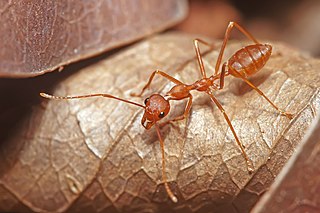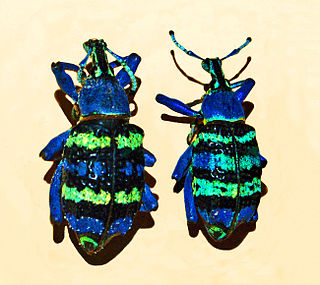
Poa pratensis, commonly known as Kentucky bluegrass, smooth meadow-grass, or common meadow-grass, is a perennial species of grass native to practically all of Europe, North Asia and the mountains of Algeria and Morocco. Although the species is spread over all of the cool, humid parts of the United States, it is not native to North America. The Spanish Empire brought the seeds of Kentucky bluegrass to the New World in mixtures with other grasses. In its native range, Poa pratensis forms a valuable pasture plant, characteristic of well-drained, fertile soil. It is also used for making lawns in parks and gardens and has established itself as a common invasive weed across cool moist climates like the Pacific Northwest and the Northeastern United States. When found on native grasslands in Canada, for example, it is considered an unwelcome exotic plant, and is indicative of a disturbed and degraded landscape.

The common blue butterfly or European common blue is a butterfly in the family Lycaenidae and subfamily Polyommatinae. The butterfly is found throughout the Palearctic. Butterflies in the Polyommatinae are collectively called blues, from the coloring of the wings. Common blue males usually have wings that are blue above with a black-brown border and a white fringe. The females are usually brown above with a blue dusting and orange spots.

The banded demoiselle is a species of damselfly belonging to the family Calopterygidae. It is often found along slow-flowing streams and rivers. It is a Eurasian species occurring from the Atlantic coast eastwards to Lake Baikal and northwestern China.

The blue-tailed damselfly or common bluetail is a damselfly, belonging to the family Coenagrionidae.

The southern hawker or blue hawker is a species of hawker dragonfly.

Oecophylla smaragdina is a species of arboreal ant found in tropical Asia and Australia. These ants form colonies with multiple nests in trees, each nest being made of leaves stitched together using the silk produced by the ant larvae: hence the name 'oecophylla' [Greek for 'leaf-house'].

The Cuban macaw or Cuban red macaw is an extinct species of macaw native to the main island of Cuba and the nearby Isla de la Juventud. It became extinct in the late 19th century. Its relationship with other macaws in its genus was long uncertain, but it was thought to have been closely related to the scarlet macaw, which has some similarities in appearance. It may also have been closely related, or identical, to the hypothetical Jamaican red macaw. A 2018 DNA study found that it was the sister species of two red and two green species of extant macaws.

Carex flacca, with common names blue sedge, gray carex, glaucous sedge, or carnation-grass,, is a species of sedge native to parts of Europe and North Africa. It is frequent in a range of habitats, including grasslands, moorlands, exposed and disturbed soil, and the upper edges of salt marshes. It has naturalized in eastern North America.

Zicrona caerulea, common name Blue Shieldbug, is a species of bugs of the family Pentatomidae.

Eupholus bennetti is a species of beetle belonging to the family Curculionidae.

Eupholus chevrolati is a species of beetle belonging to the family Curculionidae.

Eupholus geoffroyi is a species of beetle belonging to the family Curculionidae.

Eupholus magnificus is a species of beetle belonging to the family Curculionidae.

Eupholus schoenherri is a species of beetle belonging to the family Curculionidae. Eupholus petitii is sometimes included here as a subspecies.

Eupholus petitii is a disputed species of beetle belonging to the family Curculionidae.

Julodis viridipes is a species of beetle belonging to the Buprestidae family.

Eupholus azureus is a species of beetles belonging to the family Curculionidae.

Eupholus humeridens is a species of beetle belonging to the family Curculionidae.
Acropora caroliniana is a species of acroporid coral that was first described by Nemenzo in 1976. Found in tropical, shallow reef slopes, it occurs at depths of 5 to 25 m in a marine environment. The species is rated as vulnerable on the IUCN Red List, with a decreasing population. It is rare, but has been found over a large area, and two-thirds of the regions of Indonesia.

Eupholus nickerli is a species of beetle belonging to the family Curculionidae.



















